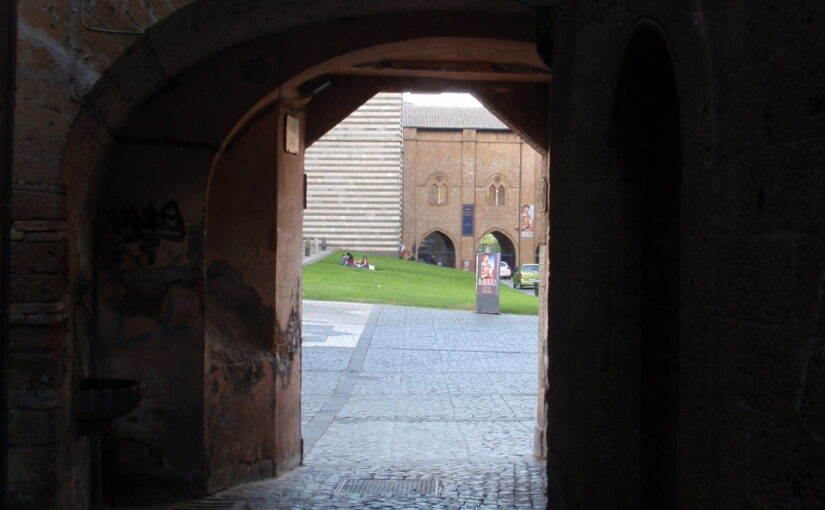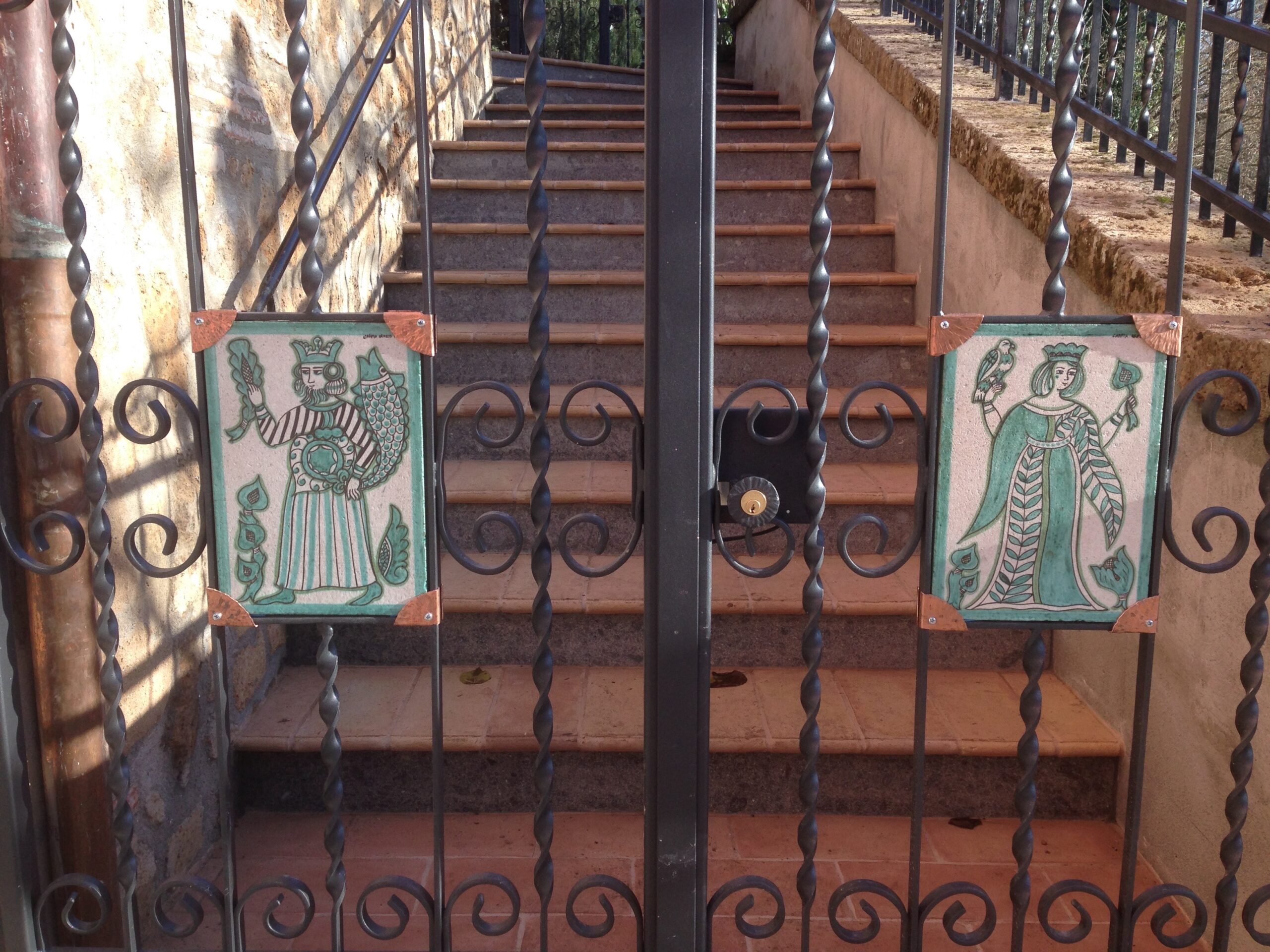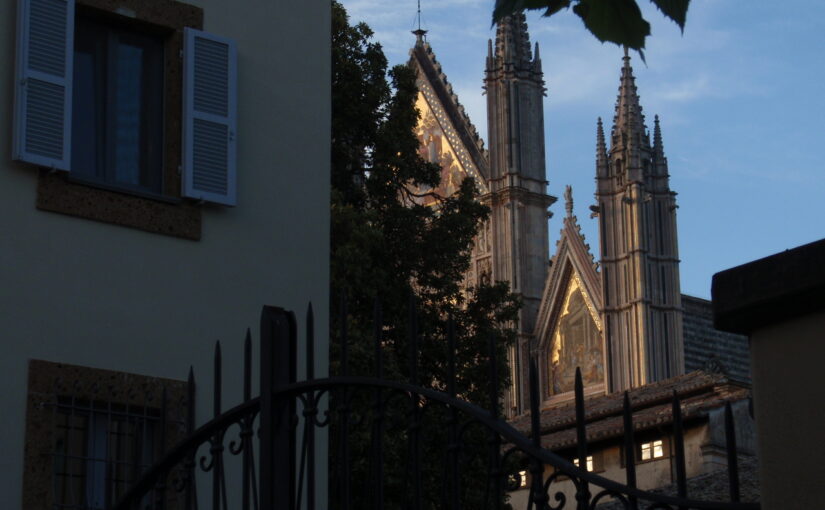Tuesday, August 23
For the record. I slept well with the usual one hour intermission. Walking the apartment was generally in good form, walking the sagrato was not. Experienced some general discomfort, but it wasn’t constant. Took a half hour zombie nap before lunch. Took awhile to get things working again. Fairly limp all day, occasionally very limp, mostly legs. Upper body was sometimes tight and rigid. Had a spontaneous opening of heart energy while out after the morning walk, Friend said “now, that’s what you want all the time.” I tried to hold on to it, then when that failed, to force it. I find myself trying to make things happen, but know that is not an effective approach.
Wednesday, August 24
My second sleep last night began at 04:00 after two hours of seeking a comfortable position. When I finally slept though, I changed positions (all of them cozy) without difficulty until Roman woke me at 08:00. It was like a miracle, and one that I hope to repeat.
Limpness, however, set a new record. We hit the sagrato after a dental cleaning, and I was so limp I couldn’t straighten my knees to walk. One lap.
A nap followed lunch and left me even limper, so after some safe moving of limbs to wake up the brain/body connection, I paced the hall from bedroom to kitchen. Between laps I would sit and imagine the rising and walking and turning I was about to do. Movement gradually became smoother. That’s similar to what Janice recommends to hasten recovery during limpness, and I vow to do that afternoon and evening.
The evening walk was awkward but not terrible. We ran into several people I know and love, before and after, and I was barely able to relate. That’s the worst of this, that and not being able to go to cultural events; it’s very isolating.
(From Stuck on Pause by Janice Hadlock)
“For [some people], accessing adrenaline does not automatically resume when pause is turned off. Instead, even after turning off pause for good, they might, from habit, automatically want to re-induce pause mode to deal with negativity or stress. In these people, it can feel as if pause mode is trying to reassert itself, with the help of the Blocker, any time stress appears. Until they increase the amount of energy that flows into the body and practice physical moves that use that power, thus increasing sympathetic mode behaviors, they might find themselves sliding back into pause mode from sheer habit: behaving and thinking in a manner similar to people in partial recovery.”
Thursday, August 25
Nothing unusual happened today, except that given movement in general it is a miracle that I am typing as well as I am. Oh, I slept very well and without an intermission; that also qualifies as miraculous.
Friday, August 26
Well, I slept three hours then never more. To start with I wasn’t sleepy, then around 06:30 that changed, but I was so intimidated trying to find a comfortable position that nothing would let go. Missed the morning walk in deference to a nap. Now, I realized yesterday that RLS has not bothered me for at least two days, and as usual I jumped to conclusions and expected that to last. No, today it was worse. My mind likes regularity and this process is the opposite from regular. Sometimes I despair, other times I take a deep breath and understand that aside from movement difficulties (and gallons of saliva) I feel well. So, I do the exercises and remember that hundreds of others have recovered in this way.
Saturday, August 27
I slept a straight eight last night, but only after doing more than an hour’s worth of exercises. Morning walk featured only one lap on the sagrato when it was defeated by plantar fasciitis on both my big toes. We’re on a program to remedy that, but have a way yet to go. Evening walk in the garage started difficult, but taking time to imagine vigorous form between laps paid off. Towards evening I was tempted to fall into a funk for my utter lack of independence, but was saved by my (re?) discovery of the PBS series, Shakespeare Uncovered.
Sunday, August 28
Slept well, walked very well at intermission, and not too badly in the garage this morning. I’m imagining walking as much as I can stay awake for. It helps. Limpness was, for the first time, a bit less pronounced today. (FORGET ABOUT THAT! By early evening, I was so limp that even with imagining elegant movement, I could barely walk.) Something about the way I move today reminds me that it is not weakness that plagues me – I am able lift things and myself with strength – it is non-responsive muscle and nerve. And yes, the limpness is still coupled by a restlessness that makes it impossible not to walk.
Also, I normally complain about being over fed. Today I was ravished by hunger every three hours. When I stopped eating, I slept. Reduced to my animal elements.
Otherwise, a day at drift. As usual, a good meeting with the PD support group on Zoom.
Monday, August 29
Two standouts today.
First a remarkable reduction of struggle. That mouth tremor that I mentioned before works like a barometer; when I struggle (that is, rush ahead of myself, refuse to accept the condition of the present moment, try willfully to “get better”) the tongue and lips begin to tremble. When I cease struggling, the tremor stops with it. Today, I stopped the habit of struggling. The tendency is still there, but I am no longer drawn to it.
Second, the imaging exercise becomes easier and bears fruit. Its first fruit is the reduction of struggle. Another remarkable result is a huge increase of energy into the medulla oblongata. I sit on the edge of my bed, swing my arms up a few times while imaging a smooth rise from sitting, then imagine a vigorous walk to the kitchen (about 12 meters round trip). Then I get up and make the trip without expectation. The results are various, subtle, and very real. One of the most notable results is that after only a few days of this my self image has changed from one of a victim to that of an addict on the mend.
Here’s what I think my history is. I turned off pause shortly after withdrawing from the levodopa drugs I had been taking for nine weeks. With that came an awareness of depleted energy through the medulla and around the pericardium, so I made various attempts at increasing it. When mobility problems (and movement issues in general) didn’t disappear, I lost faith in my perceptions of energy and turned towards physical exercise as a remedy. But that was filled with struggle, was an effort of will which is pause mental behavior, so after improving over several weeks, it would always crash to zero. This was mystifying.
By simply imagining what it is like to be without symptoms, that effort of will is going away, and even though walking is often very difficult, it feels like I’m learning to use the para/sympathetic continuum after decades of being stuck on pause. With that comes a surety that PD is a habit that only I can overcome, and that nobody and no substance or technology can do it for me. With that new attitude comes the necessary energy and clarity.
To be continued.




